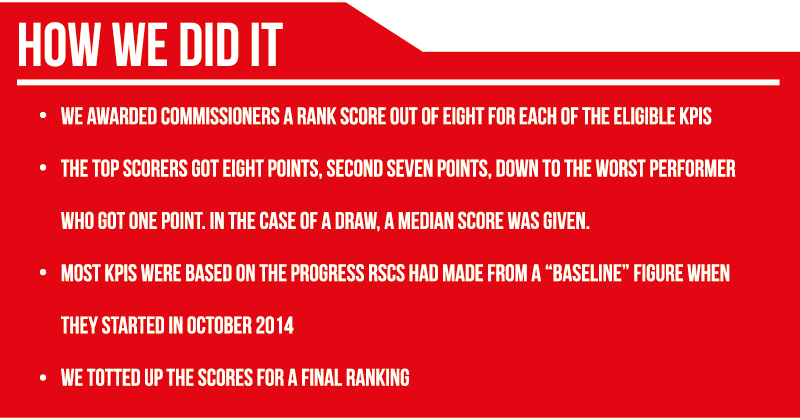After a six-month battle with the government, Schools Week has obtained the data used by ministers to assess the performance of the eight regional schools commissioners.
The figures, which have never been published, relate to the commissioners’ first year in office, from September 2014 to October 2015.
A regional schools commissioner who resigned after less than two years in post has topped Schools Week’s first “RSC’s Progress 8 league table”.
Pank Patel, the former commissioner for the West Midlands, topped our chart that analyses the eight key performance indicator (KPI) data used by the government to judge commissioners.
Sir David Carter, who has since been promoted to national schools commissioner, came second, with Janet Renou, RSC for the north, in last place.
Schools Week exclusively obtained the data after a six-month Freedom of Information battle with the Department for Education (DfE), which originally refused to release the statistics.
The figures, based on the commissioners’ first year in office, show how each RSC fared on the eight measures against which the DfE monitored their progress (although not every performance measure was released).
Commissioners have a range of powers devolved from the education secretary, including converting underperforming schools into academies, sending warning notices if academies fare below expectation and deciding whether schools can expand.
They also now have the power to intervene when schools are deemed as “coasting”, based on national exam performance data published last week.
Schools Week analysed the commissioners’ own performance data and created its own RSC league table.
After totting up scores based on a commissioner’s ability to improve the performance and number of academies in his or her area – and baselined against their starting point, for extra fairness – Patel came top, racking up 34.5 points.
He resigned in May last year to become headteacher of the George Salter academy in West Bromwich, and has since been replaced by former academy trust boss Christine Quinn.
The silver medal went to Carter, the former RSC for the south west. Dominic Herrington, RSC for the south east and south London, took bronze. Renou, who covers the north region, scored just 20.5.
Schools Week first submitted the FOI request after Carter told a committee of MPs last year that “in the spirit of transparency” he did not see why the information would not be made public.
The DfE originally refused to release the information. However, Schools Week told the Information Commissioner’s Office, the public data regulator, of the department’s decision and it subsequently released most of the information.

The RSC ‘Progress 8’: What counts in the score
KPI 1: The percentage of academies, free schools, UTCs and studio schools below the floor
Paul Smith (Lancashire and West Yorkshire) had the largest reduction of academies under the floor, from 15 per cent when the role began in 2014, to 11 per cent by October 2015 (although his region did have the largest proportion of failing academies to start with).
Five RSCs reduced the percentage by just two points – which was the joint lowest.
KPI 2: The percentage of academies, free schools, UTCs and studio schools in Ofsted inadequate, broken down by length of time
This strikes us as a bit bizarre. For instance, does the government want RSCs with higher numbers of inadequate academies for one year (meaning there could have been an influx of schools falling into inadequate) or those that have been stuck in inadequate for years?
We didn’t know what good performance looked like based on these figures so didn’t include it as part of our analysis.
KPI 3I: The percentage of schools that are academies or free schools
Pank Patel (West Midlands) was the big winner here, boosting the percentage of academies from 21 per cent in 2014 to 27 per cent by October 2015. Smith, Janet Renou (north of England) and Martin Post (north-west London and south-central England) finished bottom, boosting their share by just three percentage points.
KPI 3II: The percentage of eligible maintained schools in the region that have been approved to convert
Patel topped the charts again, increasing the number of eligible schools converted from 3 per cent in 2014, to 6 per cent in October 2015. Meanwhile bottom-of-the-table Jennifer Bexon-Smith (East Midlands and the Humber) saw her numbers drop from 4 to 2 per cent.
KPI 4: The number and percentage of academies below the floor or in Ofsted inadequate within the first two years of opening
The best-performer was Tim Coulson (east of England and north-east London), who had just 14 per cent in this category (10 per cent were sponsored and 4 per cent were converter academies). Renou had the highest – 33 per cent (31 per cent of these were sponsored).
KPI 5: The percentage of local authority cases in the region where more schools require a sponsor than there are sponsors available
The government said this data was misleading, and was scrapped as a performance measure halfway through the year, so we didn’t include it.
KPI 6: The percentage change in sponsor attainment rating
The government said this data was “inaccurate” and releasing it would “undermine the confidence” in RSCs. It’s not included in our analysis.
KPI 7: The % of approved sponsors that are active
Sir David Carter (south-west England) came top on this measure, with nearly nine in ten sponsors active. Smith came bottom with just under two-thirds.
KPI 8: The percentage of high-quality free schools, UTCs and studio schools
Dominic Herrington (South-East England and South London) had 85 per cent of high-quality schools, compared to just 56 per cent for Carter.









Oooh, you cheeky monkeys! Well done for persisting with your campaign for openness. The DfE once again demonstrating their clownishness.
Love it. If schools are to be held account for their perfomance publicly then it’s only fair that the RSC’s face the same level of scrutiny. Shame it had to be dragged out of the DfE.
Does Jan Renou become rated inadequate and rebrokered to a local authority to be sponsored…..?